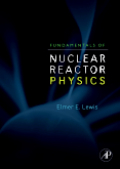
This new streamlined text offers a one-semester treatment of the essentials of how the fission nuclear reactor works, the various approaches to the design of reactors, and their safe and efficient operation. The book includes numerous worked-out examples and end-of-chapter questions to help reinforce the knowledge presented. This textbook offers an engineering-oriented introduction to nuclear physics, with a particular focus on how those physics are put to work in the service of generating nuclear-based power, particularly the importance of neutron reactions and neutron behavior.Engineering students will find this applications-oriented approach, with many worked-out examples, more accessible and more meaningful as they aspire to become future nuclear engineers. It offers a clear, general overview of atomic physics from the standpoint of reactor functionality and design, including the sequence of fission reactions and their energy release. It includes an in-depth discussion of neutron reactions, including neutron kinetics and the neutron energy spectrum, as well as neutron spatial distribution. It contains ample worked-out examples and over 100 end-of-chapter problems. It also includes a full Solutions Manual. INDICE: 1. Nuclear Reactions 1.1 Introduction 1.2 Nuclear Reaction Fundamentals 1.3 The Curve of Binding Energy 1.4 Fusion Reactions 1.5 Fission Reactions 1.6 Fissile and Fertile Materials 1.7 Radioactive Decay 2. Neutron Interactions 2.1 Introduction 2.2 Neutron Cross Sections 2.3 Neutron Energy Range 2.4 Cross Section Energy Dependence 2.5 Neutron Scattering 3. Neutron Distributions in Energy 3.1 Introduction 3.2 Nuclear Fuel Properties 3.3 Neutron Moderators 3.4 Neutron Energy Spectra 3.5 Energy-Averaged Reaction Rates 3.6 Infinite Medium Multiplication: 4. The Power Reactor Core 4.1 Introduction 4.2 Core Composition 4.3 Fast Reactor Lattices 4.4 Thermal Reactor Lattices 5. Reactor Kinetics 5.1 Introduction 5.2 Neutron Balance Equations 5.3 Multiplying Systems Behavior 5.4 Delayed Neutron Kinetics 5.5 Step Reactivity Changes 5.6 Prolog to Reactor Dynamics 6. Spatial Diffusion of Neutrons 6.1 Introduction 6.2 The Neutron Diffusion Equation 6.3 Non-multiplying Systems- Plane Geometry 6.4 Boundary Conditions 6.5 Non-multiplying Systems- Spherical Geometry 6.6 Diffusion Approximation Validity 6.7 Multiplying Systems 7. Neutron Distributions in Reactors 7.1 Introduction 7.2 The Time-Independent Diffusion Equation 7.3 Uniform Reactors 7.4 Neutron Leakage 7.5 Reflected Reactors 7.6 Control Poisons 8. Energy Transport 8.1 Introduction 8.2 Core Power Distribution 8.3 Heat Transport 8.4 Thermal Transients 9. Reactivity Feedback 9.1 Introduction 9.2 Reactivity Coefficients 9.3 Composite Coefficients 9.4 Excess Reactivity and Shutdown Margin 9.5 Reactor Transients 10. Long Term Core Behavior 10.1 Introduction 10.2 Reactivity Control 10.3 Fission Product Buildup and Decay 10.4 Fuel Depletion 10.5 Fission Product and Actinides Inventories Appendices A. Useful MathematicsB. Bessel's Equation and Functions C. Derivation of Neutron Diffusion Properties D. Fuel Element Heat Transfer E. Nuclear Data
- ISBN: 978-0-12-370631-7
- Editorial: Academic Press
- Encuadernacion: Cartoné
- Páginas: 280
- Fecha Publicación: 01/04/2008
- Nº Volúmenes: 1
- Idioma: Inglés
